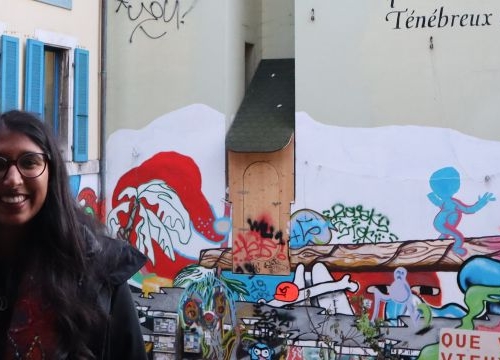MAS in Transitional Justice, Human Rights and the Rule of Law: What our Students Say
1 February 2021
In this interview, Dasha Reddy, currently enrolled in our MAS in Transitional Justice, Human Rights and the Rule of Law (MTJ), tells us about the programme and life in Geneva.
About Me
My name is Dasha Reddy. I am originally from South Africa but moved to Canada when I was young. Prior to studying at the Geneva Academy, I completed a Master of Public Health, concentrating on global health and health of displaced persons. I had the opportunity to work in various roles relating to migrant health and wellbeing, including as a Community Engagement Coordinator for resettled refugee women, as a Health Officer intern with the United Nations High Commissioner for Refugees, and as a Health Researcher. My work and education have enabled me to conceptualise health as an intersecting field with human rights law, an intersection that I am constantly eager to learn more about.
In addition to my work, I am a lover of the outdoors. Anything from hiking to landscape photography excites me. In my spare time, you can either find me on a mountain or taking advantage of the delicious chocolate and cheese of Switzerland.
Why did you choose the MTJ at the Geneva Academy?
The main factors that pushed me to choose the MTJ at the Geneva Academy were the school's unique setting, the diverse student body that it draws, and its interdisciplinary approach to transitional justice. Studying in the humanitarian and human rights hub of the world is an exceptional opportunity to envelop oneself in an inspirational environment. Additionally, the diverse and colourful combination of people coming into the programme from different backgrounds, cultures and professional experiences creates a dynamic, enriching and thought-provoking atmosphere.
What are you particularly enjoying about this programme?
What I admire most about the MTJ programme is the incredible cohort of people I’ve had the opportunity to meet. I am continually inspired by my classmates’ bravery in confronting systems of oppression through the lens of transitional justice. I feel lucky and proud to be able to learn from and share this experience with newfound friends that I know are going to go on to do amazingly impactful work.
What are you planning to do next?
I am planning to continue my academic studies by pursuing a PhD. I am hopeful that the Geneva Academy’s academic research spring track will help me further develop the tools, skills, and cross-disciplinary mindset that is required to successfully work toward a PhD while remaining rooted in the application of such knowledge.
Why did you choose to be photographed in front of this Wall?
I chose to be photographed here because it is the most colourful place that I found in Geneva. Graffiti can be used as a powerful form of social emancipation and activism. For me, this specific wall of art reflects the rich cultural mosaic that permeates through the city; an aspect of Geneva that I value.








